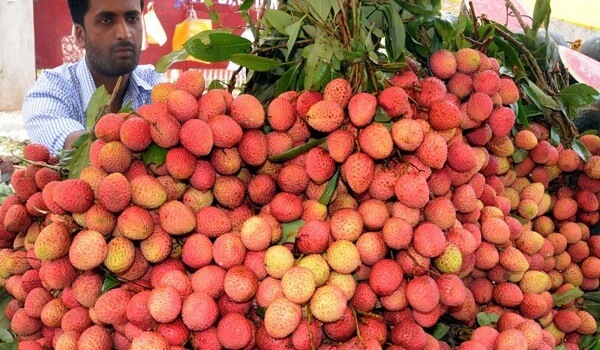Cultivation of Litchi, traditionally restricted to Muzaffarpur Bihar, has witnessed a significant expansion across 19 Indian states, highlighting the Horticulture boost in India.This development stems from the efforts of the National Research Centre on Litchi (NRCL) based in Muzaffarpur, Bihar.
Key Facts about Litchi
- Botanical Classification: Litchi belongs to the Sapindaceae family and is known for its delicious, juicy, translucent aril or edible flesh.
- Climatic Requirements: Litchi thrives in sub-tropical climates and prefers moist conditions. It grows best in regions with low elevation, up to an altitude of around 800 meters.
- Soil Preference: The ideal soil for litchi cultivation is deep, well-drained loamy soil rich in organic matter.
- Temperature Sensitivity: Litchi is sensitive to extreme temperatures. It does not tolerate temperatures above 40.5 degrees Celsius in summer or freezing temperatures in winter.
- Rainfall Impact: Prolonged rain, especially during flowering, can interfere with pollination and affect the crop adversely.
- Geographical Cultivation: In India, the commercial cultivation was traditionally restricted to the north in the foot hills of Himalayas from Tripura to Jammu & Kashmir and plains of Uttar Pradesh and Madhya Pradesh.But due to increased demand and viability, cultivation has expanded to states like Bihar, Jharkhand, and Chhattisgarh.Bihar alone accounts for nearly 40% of India’s litchi production. Bihar is followed by West Bengal (12%) and Jharkhand (10%).
- Global Production: India ranks as the second largest producer of litchi globally, following China. Other significant litchi-producing countries include Thailand, Australia, South Africa, Madagascar, and the United States.
Horticulture
- Horticulture refers to the science, art, and practice of cultivating fruits, vegetables, flowers, ornamental plants, and other crops.
- It encompasses a broad spectrum of activities related to plant cultivation, management, propagation, and improvement for human use and enjoyment.
Initiatives for Horticulture
Mission for Integrated Development of Horticulture
- MIDH is a Centrally Sponsored Scheme for the holistic growth of the horticulture sector covering fruits, vegetables and other areas.
- Under MIDH, Government of India contributes 60% of the total outlay for developmental programmes in all the states (except North Eastern and Himalayan states where GOI contributes 90%) & 40% is contributed by State governments.
Horticulture Cluster Development Programme
- It is a central sector programme aimed at growing and developing identified horticulture clusters to make them globally competitive.
- Horticulture cluster is a regional/geographical concentration of targeted horticulture crops.

